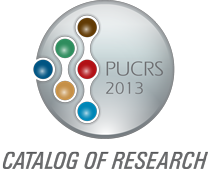Foreword
Research Structures
Energy, Environment, and Biodiversity
- Metallic Materials Engineering
- Solar Energy
- Biodiversity and Ecosystems in Fields and Forests of the Atlantic Forest
- Economic, Human, and Environmental Development
- Primatology
- Genetics, Evolution, Ecology, and Conservation of Carnivores
- Oleochemistry: Processes and Products
- Technologies to Mitigate Environmental Impacts
- Ichthyology
- Ornithology
- The Center for Wind Energy
Humanities and Ethics
- Fundamental Rights
- Theological and Ethical Anthropology
- The Political Authoritarianism and Press in Contemporary Brazil
- Christology within the Contemporary Latin American Context
- Law and Bioethics
- Clinical Bioethics
- Ecclesiology and Emergent Problems
- Analytic Epistemology
- Ethics, Contemporaneity, and Deconstruction: The Philosophical Criticism of Violence
- Immigration, Towns, and Foreigners Narratives of Brazil (1864–1964)
- Criminal Procedure and Democratic Rule of Law
Culture and Education
- Southern Writers Collection
- Architecture and Heritage
- Culture, Subjectivity, and Formative Policies
- Between the Memories and Stories of Schools at Rio Grande do Sul: From the Deutscher Hilfsverein to Farroupilha School (1858-2008)
- Enunciation and Discourse
- Education for Health and Inclusive Education
- Teaching of Physics
- Format Y: Formation in Mathematics for Generation Y
- History of Literature: The Investigation and Diffusion of Sources
- Reading Literature: The School and Other Social Agencies
- Chemical Education
- Relationship between the Nature of Science and Science Education
- Literature, History, and Theories on the Imaginary
- Training of Professors, Licentiates, and Pedagogical Practices
Society and Development
- Companies and Organizations
- Law and Economy
- Study and Research on Violence
- Family, Social Work, and Health
- Architecture and Industrialization
- Agribusiness
- Social Well-being Economics
- Applied Mathematics
- Class Action Lawsuits
- Psychology and Social Policies: Memory, History, and Production of the Present Time
- Inter-organizational Relationships and Systemic Competitiveness
- Parties, Elections, and Political Communication
- Fundamental Principles of Tax Law
- Social Demands and Policies
Information and Communication Technology
- Wireless, Wired, and Optic Communications
- Organizational Communication
- Strategy and Innovation
- Hardware Project Support
- Computing Molecular Biophysics – The Modeling and Simulation of Biosystems
- Technological Development in Telehealth
- Resource Management and Virtualization
- The Management and Governance of Information Technology
- International News at the Global Village
- Communication Science
- Ubiquity and Technological Convergences in Communication
- Aerospace Research
- The Performance Evaluation Group
- The Group on Systems, Signals, and Computing
Biology and Health
- Cancer and Other Pathologies of the Oral and Maxillofacial Region
- Memory
- Molecular and Functional Biology
- Cardiometabolic Risk, Aging, and Nutrition
- Health Education and Work
- Structural Biochemistry
- Pediatric Respirology
- Applied Pharmacology: Characterization of Mechanisms Involved in Pain, Inflammation and Cancer
- Immunology and Immunodiagnostics
- Nephrology
- Neurosciences
- Orthodontics
- The Promotion of Health in Longevity
- Olympic Studies and Health Sciences
- Nerve Regeneration
- Intensive Neonatal Medicine and Congenital Infections
- Aerospace Pharmacy
- Medical Imaging
- Pulmonology
- Orofacial Pain and Temporomandibular Disorders
- Metabolic Transformations of Purines of Biological Importance
- The Study of Parasitosis, Biochemical Parameters, and Hematological Parameters Associated with Aging
- Aerospace Science
- Bioethics and Ethics Applied to Animals
- Pharmacovigilance
- Evaluation and Intervention in the Life Cycle
- Surgery for Obesity and Metabolic Syndrome
- Modification of Lifestyle and Cardiovascular Risk
- Nanostructures and Nanoscopy
- Clinical and Experimental Neuropsychology
- Psychology of Occupational Health
- Memory and Neurodegeneration
- Epidemiology, Neurology, and Immunology
- Chemistry of Natural Products
- Health Economics
Research Structures and Researchers
- RESEARCH STRUCTURES AND RESEARCHERS
- Business School: Management, Accounting and Economics (FACE)
- School of Architecture and Urbanism (FAU)
- School of Biosciences (FABIO)
- School of Aeronautical Sciences (FACA)
- School of Social Communication (FAMECOS)
- Law School (FADIR)
- School of Education (FACED)
- School of Physical Education and Sport Science (FEFID)
- School of Nursing, Nutrition and Physiotherapy (FAENFI)
- School of Engineering (FENG)
- School of Pharmacy (FFARM)
- School of Philosophy and Human Sciences (FFCH)
- School of Physics (FAFIS)
- School of Computer Science (FACIN)
- School of Letters: Languages, Linguistics and Literature (FALE)
- School of Mathematics (FAMAT)
- School of Medicine (FAMED)
- School of Dentistry (FO)
- School of Psychology (FAPSI)
- School of Chemistry (FAQUI)
- School of Social Work (FSS)
- School of Theology (FATEO)
- Institute of Bioethics (IB)
- Institute of Geriatrics and Gerontology (IGG)
- Institute of Research and Development (IDÉIA)
- Institute of Biomedical Research (IPB)
- Institute of Toxicology and Pharmacology (INTOX)
- Institute of the Brain (InsCer)
- Institute of Environment and Natural Resources (IMA)
- Museum of Sciences and Technology (MCT)
Italians report on 19th and 20th century Brazil
The Research Group on Immigration, Towns, and Foreigners’ Narratives of Brazil (1864–1964) seeks to become a reference in documentary information on the perception of 19th and 20th century Brazil by Italian men and women. To maintain such a status, the team chaired by Professor Nuncia Constantino conducts interviews, translates books, and investigates biographies aiming for a better understanding of how the mores and ethos of the native country conditioned the perceptions of Europeans as either immigrants or not.
The narratives published as books by at least 60 Italian travelers who visited Brazil between 1861 and 1910 are the focus of one of the main research projects developed by this group, which is linked to the postgraduate History program. In research conducted at the main Italian libraries, Professor Nuncia Constantino had access to books written by D’Elia, Buccelli, Serra, Buscaglione, and Giglioli and to other authors who remained in Brazil as doctors, scientists, merchants, missionaries, or tourists. Partially translated, those books report on Brazilian sanitary, behavioral, and cultural problems.
To learn more about Italian immigrant women, oral interviews are the preferred technique. Tapes recorded more than 20 years ago are available at Delfos – Space for Documentation and Cultural Memory, located at the PUCRS Central Library. These files will be made available on the group’s website in 2013..
The autobiography of the artist, writer, and social activist Lydia Moschetii is a current target of study. Moschetti participated in the creation of several social and cultural institutions, such as the Eye Bank Hospital and the Female Literary Academy of Rio Grande do Sul. Her trajectory is being investigated in partnership with the Areia International Association of University of Genoa (Italy).
The group comprises more than 40 members, from undergraduate students to professors and has established a network of international collaborations that includes the universities of Nantes (France), Groningen (The Netherlands), and Urbino (Italy).




